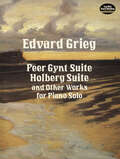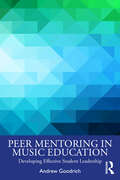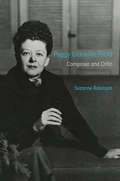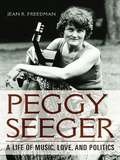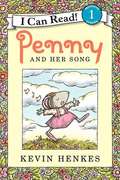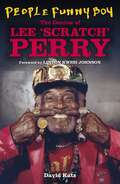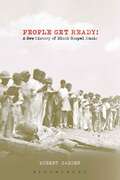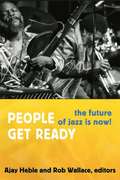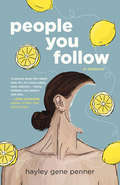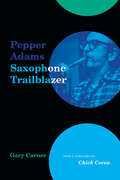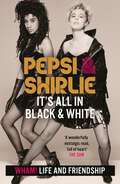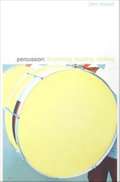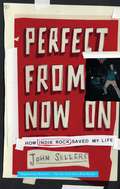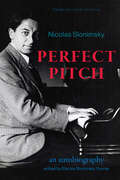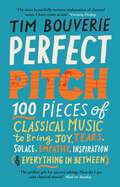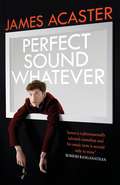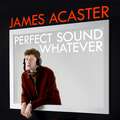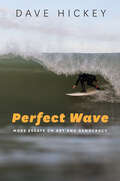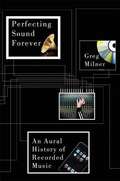- Table View
- List View
Peer Gynt Suite, Holberg Suite, and Other Works for Piano Solo
by Edvard GriegTreasury of piano music by great Norwegian composer, including the perennial favorites, Peer Gynt Suites Nos. 1 and 2 and the Holberg Suite, as well as a rich selection of other pieces: Vier Stucke, Op. 1, Humoresker, Op. 6, Sonata in E Minor, Op. 7, Zwei elegische Melodien, Op. 34, Stimmungen, Op. 73 and many others. Authoritative C. F. Peters edition.
Peer Mentoring in Music Education: Developing Effective Student Leadership
by Andrew GoodrichPeer Mentoring in Music Education: Developing Effective Student Leadership offers a practical guide to peer mentoring in music education, enabling music teachers to implement and benefit from this technique with their students. Drawing on extensive and current research in education and music education, the core focus of this book is on the instructional practice of peer mentoring and how students can become effective leaders. Through case studies and examples focused on music education, the author shows how peer mentoring can transform learning for all students and foster student leadership as part of a student-centered instructional approach. Part I explores the foundations of these instructional practices, the role of the music teacher, the role of the student, and how socializing and student leadership contribute to meaningful learning. Part II portrays stories of four exemplary music teachers who use peer mentoring and student leadership in their music programs across a wide array of age levels and music classes and ensembles. Music teachers will benefit from learning about the transformative power of peer mentoring and student leadership, and how these instructional practices aid with diversity, equity, inclusion, and access so that all students are valued in the music class and ensemble. Peer Mentoring in Music Education: Developing Effective Student Leadership provides a comprehensive guide for in-service and preservice music teachers seeking to understand peer mentoring and incorporate this technique in teaching.
Peggy Glanville-Hicks: Composer and Critic (Music in American Life)
by Suzanne RobinsonAs both composer and critic, Peggy Glanville-Hicks contributed to the astonishing cultural ferment of the mid-twentieth century. Her forceful voice as a writer and commentator helped shape professional and public opinion on the state of American composing. The seventy musical works she composed ranged from celebrated operas like Nausicaa to intimate, jewel-like compositions created for friends. Her circle included figures like Virgil Thomson, Paul Bowles, John Cage, and Yehudi Menuhin. Drawing on interviews, archival research, and fifty-four years of extraordinary pocket diaries, Suzanne Robinson places Glanville-Hicks within the history of American music and composers. "P.G.H."--affectionately described as "Australian and pushy"--forged alliances with power brokers and artists that gained her entrance to core American cultural entities such as the League of Composers, New York Herald Tribune, and the Harkness Ballet. Yet her impeccably cultivated public image concealed a private life marked by unhappy love affairs, stubborn poverty, and the painstaking creation of her artistic works. Evocative and intricate, Peggy Glanville-Hicks clears away decades of myth and storytelling to provide a portrait of a remarkable figure and her times.
Peggy Seeger: A Life of Music, Love, and Politics
by Jean R. FreedmanBorn into folk music's first family, Peggy Seeger has blazed her own trail artistically and personally. Jean Freedman draws on a wealth of research and conversations with Seeger to tell the life story of one of music's most charismatic performers and tireless advocates. Here is the story of Seeger's multifaceted career, from her youth to her pivotal role in the American and British folk revivals, from her instrumental virtuosity to her tireless work on behalf of environmental and feminist causes, from wry reflections on the U.K. folk scene to decades as a songwriter. Freedman also delves into Seeger's fruitful partnership with Ewan MacColl and a multitude of contributions which include creating the renowned Festivals of Fools, founding Blackthorne Records, masterminding the legendary Radio Ballads documentaries, and mentoring performers in the often-fraught atmosphere of The Critics Group. Bracingly candid and as passionate as its subject, Peggy Seeger is the first book-length biography of a life set to music.
Pennington's Heir (Pennington #3)
by K. M. PeytonGetting out of prison was like being born again, said Patrick Pennington. His adoring girl friend, seventeen-year-old Ruth Hollis, was waiting for him. Professor Hampton, Pat's piano teacher, had waited, too, for his impetuous star pupil to get out and get back to his music again. Now it looked like a sure, straight road to success, if Pat could just keep himself out of trouble and stick with his studies. But trouble and Pat Pennington have an affinity for each other. When Ruth tells him she is going to have his baby, Pat must face a new kind of problem--one that threatens both his personal happiness and his future as a concert pianist. Patrick Pennington, the rebellious and talented anti-hero of Pennington's Last Term and The Beethoven Medal, doesn't settle easily into the role of husband, father, and breadwinner. With humor, compassion, and deep insight, K. M. Peyton portrays a very young, very loving couple's rocky first year of marriage.
Penny And Her Song (I Can Read Level 1 Series)
by Kevin HenkesWhen Penny comes home from school, she is ready to sing her song. But the babies are sleeping, and Mama and Papa are worried that Penny will wake them up. Oh, but it is a good song, a really wonderful song . . . and Penny wants more than anything to sing it. What do you think will happen?
People Funny Boy: The Genius of Lee 'Scratch' Perry
by David Katz'David Katz's in-depth portrayal of his genius is to be commended and is an essential addition to any serious music fan's collection' David Rodigan MBE OD'For the complete picture of this musical genius you can't get better than David Katz's People Funny Boy - if you're into Scratch, it's essential' Don LettsArguably the most influential force in Jamaican music, Lee Perry brought Bob Marley to international stardom and has since collaborated with artists such as Sir Paul McCartney, The Clash and The Beastie Boys. The book delves behind the myth of Perry to give a fuller examination of his life and work through extensive interviews with family members, fellow artists, friends, lovers, enemies, as well as the man himself to present a complex portrait of a unique soul driven by unseen spiritual forces. This revised and expanded edition has been thoroughly updated and completely overhauled to render a more nuanced, accurate and accessible read, with new information on Perry's later years, including his Grammy Award, cessation of herb smoking and final passing, as well as previously unpublished information about his early life, his unique relationship with Marley, and his fabled Black Ark studio.
People Funny Boy: The Genius of Lee 'Scratch' Perry
by David Katz'David Katz's in-depth portrayal of his genius is to be commended and is an essential addition to any serious music fan's collection' David Rodigan MBE OD'For the complete picture of this musical genius you can't get better than David Katz's People Funny Boy - if you're into Scratch, it's essential' Don LettsArguably the most influential force in Jamaican music, Lee Perry brought Bob Marley to international stardom and has since collaborated with artists such as Sir Paul McCartney, The Clash and The Beastie Boys. The book delves behind the myth of Perry to give a fuller examination of his life and work through extensive interviews with family members, fellow artists, friends, lovers, enemies, as well as the man himself to present a complex portrait of a unique soul driven by unseen spiritual forces. This revised and expanded edition has been thoroughly updated and completely overhauled to render a more nuanced, accurate and accessible read, with new information on Perry's later years, including his Grammy Award, cessation of herb smoking and final passing, as well as previously unpublished information about his early life, his unique relationship with Marley, and his fabled Black Ark studio.
People Get Ready!: A New History Of Black Gospel Music
by Robert DardenPeople Get Ready!: A New History of Gospel Music is a passionate, celebratory, and carefully researched chronology of one of America's greatest treasures. From Africa through the spirituals, from minstrel music through jubilee, and from traditional to contemporary gospel, People Get Ready! shows the links between styles, social patterns, and artists. The emphasis is on the stories behind the songs and musicians. From the nameless slaves of Colonial America to Donnie McClurkin, Yolanda Adams, and Kirk Franklin, People Get Ready! provides, for the first time, an accessible overview of this musical genre. In addition to the more familiar stories of Thomas A. Dorsey and Mahalia Jackson, the book offers intriguing new insights into the often forgotten era between the Civil War and the rise of jubilee-that most intriguing blend of minstrel music, barbershop harmonies, and the spiritual. Also chronicled are the connections between some of gospel's precursors (Blind Willie Johnson, Arizona Dranes, and Sister Rosetta Tharpe) and modern gospel stars, including Andrae Crouch and Clara Ward. People Get Ready! knits together a number of narratives, and combines history, musicology and spirituality into a coherent whole, stitched together by the stories of dozens of famous and forgotten musical geniuses.
People Get Ready: The Future of Jazz Is Now!
by Rob Wallace Heble AjayIn People Get Ready, musicians, scholars, and journalists write about jazz since 1965, the year that Curtis Mayfield composed the famous civil rights anthem that gives this collection its title. The contributors emphasize how the political consciousness that infused jazz in the 1960s and early 1970s has informed jazz in the years since then. They bring nuance to historical accounts of the avant-garde, the New Thing, Free Jazz, "non-idiomatic" improvisation, fusion, and other forms of jazz that have flourished since the 1960s, and they reveal the contemporary relevance of those musical practices. Many of the participants in the jazz scenes discussed are still active performers. A photographic essay captures some of them in candid moments before performances. Other pieces revise standard accounts of well-known jazz figures, such as Duke Ellington, and lesser-known musicians, including Jeanne Lee; delve into how money, class, space, and economics affect the performance of experimental music; and take up the question of how digital technology influences improvisation. People Get Ready offers a vision for the future of jazz based on an appreciation of the complexity of its past and the abundance of innovation in the present. Contributors. Tamar Barzel, John Brackett, Douglas Ewart, Ajay Heble, Vijay Iyer, Thomas King, Tracy McMullen, Paul D. Miller/DJ Spooky, Nicole Mitchell, Roscoe Mitchell, Famoudou Don Moye, Aldon Lynn Nielsen, Eric Porter, Marc Ribot, Matana Roberts, Jaribu Shahid, Julie Dawn Smith, Wadada Leo Smith, Alan Stanbridge, John Szwed, Greg Tate, Scott Thomson, Rob Wallace, Ellen Waterman, Corey Wilkes
People You Follow: A Memoir
by Hayley Gene Penner“A journey down the rabbit hole of LA's most subtly toxic industry ... funny, brilliant, coy, playful, and wise.” — LENA DUNHAM, author of Not That Kind of Girl Musician Hayley Gene Penner tells all in this harrowingly honest memoir. Singer-songwriter Hayley Gene Penner's memoir takes a brutally honest yet humorous look at the dark, intimate truths we spend our lives running from. Like a map of beautiful mistakes, Hayley’s stories of questionable sexual encounters, artistic aspirations, and emotional abuse trace her coming of age in the music industry. Hayley explores all her relationships — from her childhood as the daughter of a celebrity, to the destructive and coercive relationship with her boss, to her encounter with the actor we all know but who mustn’t be named — and brings them together in a series of sharp, touching vignettes. People You Follow straddles the delicate boundary between ethical and unethical behaviour, self-protection and self-destruction, power and weakness, giddiness and despair.
Pepper Adams: Saxophone Trailblazer (Excelsior Editions)
by Gary CarnerPepper Adams is more than a definitive biography of Park "Pepper" Adams (1930–1986). The culmination of thirty-seven years of research, it's a fascinating account of Adams's life and times, thanks to colorful vignettes drawn from the author's 250 unpublished conversations with Adams and other esteemed musicians. These candid observations about Adams and his colleagues reveal previously confidential aspects of Adams's complex personality, his many outstanding achievements, and little-known facts about musicians with whom he worked, such as Thad Jones, Miles Davis, Charlie Parker, John Coltrane, Elvin Jones, Charles Mingus, Stan Kenton, Duke Ellington, Bobby Timmons, Wardell Gray, Dizzy Gillespie, Thelonious Monk, and others. Musicians, jazz fans and collectors, and readers who enjoy a hero's journey will be intrigued by Adams's extraordinary intelligence, the extent of his influence, the reverence he commanded, and his struggle to be rewarded as the unique stylist that he was throughout his career. Moreover, readers will be enlivened by the author's unique approach to biography, in which storytelling moves thematically, sometimes in reverse chronological order.
Pepsi & Shirlie - It's All in Black and White: Wham! Life and Friendship
by Pepsi Demacque-Crockett Shirlie KempLondon. Wham! Pop, glitz and glamour. And two girls with stars in their eyes.Our friendship began one windy day in 1982, outside Finsbury Park tube. It was an instant like at first sight. We were on our way to a Wham! rehearsal. Pepsi was the new girl in the band and over a car stereo, a cassette tape and that journey to Bushey we bonded. We had no idea that we were on the first of many journeys together and that soon we'd be travelling all over Europe, Australia, America, China and Japan. Or that no matter where we went, together, we'd find a way to make every exotic destination feel like home.We'd both been teenagers during the seventies – a dreary and difficult decade, especially if you were young in London and you didn't have much money.So, in 1982, anything was possible for us – a pair of twentysomethings who hadn't been to university, who didn't have any money, who dreamt of singing and dancing, but ultimately lived for fun. Everything felt new and life was a question mark. We had no idea what was lying ahead, but we wanted to say yes.What we didn't know was that we were saying yes to a lifetime of connection that has endured whatever we've done, wherever we've been. From the side of the stage to its centre – we have many stories to tell.And it's all here, it's all in black and white.
Pepsi & Shirlie - It's All in Black and White: Wham! Life and Friendship
by Pepsi Demacque-Crockett Shirlie KempLondon. Wham! Pop, glitz and glamour. And two girls with stars in their eyes.Our friendship began one windy day in 1982, outside Finsbury Park tube. It was an instant like at first sight. We were on our way to a Wham! rehearsal. Pepsi was the new girl in the band and over a car stereo, a cassette tape and that journey to Bushey we bonded. We had no idea that we were on the first of many journeys together and that soon we'd be travelling all over Europe, Australia, America, China and Japan. Or that no matter where we went, together, we'd find a way to make every exotic destination feel like home.We'd both been teenagers during the seventies – a dreary and difficult decade, especially if you were young in London and you didn't have much money.So, in 1982, anything was possible for us – a pair of twentysomethings who hadn't been to university, who didn't have any money, who dreamt of singing and dancing, but ultimately lived for fun. Everything felt new and life was a question mark. We had no idea what was lying ahead, but we wanted to say yes.What we didn't know was that we were saying yes to a lifetime of connection that has endured whatever we've done, wherever we've been. From the side of the stage to its centre – we have many stories to tell.And it's all here, it's all in black and white.
Percussion: Drumming, Beating, Striking
by John MowittPercussion is an attempt--in the author's words--to make sense of "senseless beating," to grasp how rhythm makes sense in music and society. Both a scholar and a former professional drummer, John Mowitt forges a striking encounter between cultural studies and new musicology that seeks to lay out the "percussive field" through which beating--specifically the backbeat that defines early rock-and-roll--comes to matter for raced, urban subjects. For Mowitt, percussion is both an experience of embodiment--making contact in and on the skin--and a provocation for critical theory itself. In delimiting the percussive field, he plays drumming off against the musicological account of the beat, the sociological account of shock and the psychoanalytical account of fantasy. In the process he touches on such topics as the separation of slaves and drums in the era of the slave trade, the migration of rural blacks to urban centers of the North, the practice and politics of "rough music," the links between interpellation and possession, the general strike, beating fantasies, and the concept of the "skin ego. " Percussion makes a fresh and provocative contribution to cultural studies, new musicology, the history of the body and critical race theory. It will be of interest to students of cultural studies and critical theory as well as readers with a serious interest in the history of music, rock-and-roll and drumming.
Perfect From Now On: How Indie Rock Saved My Life
by John SellersTOP FIVE MUSICAL THINGS I HOPE HAPPEN NOW THAT THE ORIGINAL LINEUPS OF THE PIXIES AND DINOSAUR JR. HAVE REUNITED1. Ian Curtis is resurrected. 2. The Smiths reunite for a private party at my favorite bar. 3. There is a new My Bloody Valentine album. 4. A new Nirvana comes along to blow away all of those fey Duran Duran emulators. 5. Radiohead stops listening to Pink Floyd and starts listening to Black Sabbath. If you've ever made, or conceived of, a list like this, then look no further for your next book purchase. You have it. In your hands. Please consider it as your next book purchase. In Perfect From Now On, John Sellers has written a fan's memoir overflowing with humor, self-deprecation, encyclopedic knowledge of musical minutiae, and "you should have been there" personal anecdotes. Despite vowing never to get caught up in music due to the nuttiness of a Dylan-obsessed father and playground taunts about his preference for Top 40 trash, he found himself powerless to resist the allure of indie rock, the genre that begat the likes of Sonic Youth, Pavement, Built to Spill, and Modest Mouse. When his favorite band, Guided By Voices, called it quits in 2004, Sellers examined his own listening habits, caught a few mind-blowing shows, got drunk with his heroes, and wrote this book -- one that is sure to resonate with anybody who has ever obsessed over good music.
Perfect Pitch, Third Revised Edition: An Autobiography (Excelsior Editions)
by Nicolas SlonimskyPerfect Pitch tells the compelling story of Nicolas Slonimsky. A boy prodigy as a pianist, Slonimsky fled pre-Communist Russia, reaching Paris at the height of another revolution—one in music and the arts. His early association with conductor Serge Koussevitzky brought him into contact with many of the era's greatest talents, including Igor Stravinsky and Serge Prokofiev. Emigrating to Boston in 1925, he embarked on a writing career, authoring key works still in print decades after their first publication, including Music Since 1900, a chronological history; Lexicon of Musical Invective, which proved definitively that new works are rarely understood in their time; and Thesaurus of Scales and Melodic Patterns, which inspired generations of composers and performers, including jazz saxophonist John Coltrane. Known for his sharp wit, Slonimsky appeared on The Tonight Show with Johnny Carson and was befriended by Frank Zappa. Perfect Pitch captures a life that was rich with discovery and invention and spanned a century of revolutions and explorations. This new edition is enhanced with several previously unpublished photographs, an extensive oral history, and several original essays, some reprinted for the first time.
Perfect Pitch: 100 pieces of classical music to bring joy, tears, solace, empathy, inspiration (& everything in between)
by Tim Bouverie'If you want to understand classical music but don't know where to start, this is the perfect introduction'. - Alan Titchmarsh'A treat from the very first page... written with style and humour, this is a perfect introduction to classical music for a beginner, a companion for the music lover, and sheer entertainment for both.' - Joanna Lumley'Thank you to Tim Bouverie for this book which can be enjoyed as much by the hard-nosed professional as the beginner, anxious to learn something of this great music.' - Jools HollandNearly all of us have the capacity to enjoy classical music but too often we are put off by not knowing where to look, or what we are actually looking for. We feel the need of a guide to help navigate such vast and varied artistic terrain.With this delightful book, historian Tim Bouverie provides just this. Drawing on his lifelong passion for music, he has created a compilation of 100 classical masterpieces sure to move and be enjoyed by almost anyone. Some are well-known, some more idiosyncratic, others hidden gems waiting to be brought into the light. All are intended to comfort and inspire. He provides a short introduction to each piece - variously anecdotal, personal, historical and quirky - and a recommended recording to try.Highly accessible and entertaining, Perfect Pitch is filled with engrossing stories and insights that bring to life 300 years of the world's greatest music.An accompanying playlist is available on Spotify.'The most beautifully written explanation of classical music I have come across. I was totally enchanted by it... Each short introduction left me eager to hear the music itself.' - Victoria Hislop'Generous and passionate... Tim Bouverie's selection of music is wide-ranging, and his introductions to each piece astutely blend context and anecdote, always delivered with smiling and enthusiastic authority.' - Dame Jane Glover, conductor and author of Mozart's Women'You are new to classical music? I can think of no better introduction. Already know your classical music? I can think of no better companion, no more rewarding way of extending your own knowledge.' - John Suchet, Classic FM'A wonderful selection of music that nourishes the soul, giving comfort as well as joy. Both witty and profound, this is a book which provides insight into life as well as art.' - Julia Samuels, author of Grief Works and This Too Shall Pass
Perfect Pitch: 100 pieces of classical music to bring joy, tears, solace, empathy, inspiration (& everything in between)
by Tim Bouverie'Sharply insightful and vividly imaginative... the perfect Christmas gift for anyone asking: 'How do I get into classical music?'' - Rupert Christiansen, Mail on Sunday'A treat from the very first page... written with style and humour, this is a perfect introduction to classical music for a beginner, a companion for the music lover, and sheer entertainment for both.' - Joanna LumleyNearly all of us have the capacity to enjoy classical music but too often we are put off by not knowing where to look, or what we are actually looking for. We feel the need of a guide to help navigate such vast and varied artistic terrain.With this delightful book, historian Tim Bouverie provides just this. Drawing on his lifelong passion for music, he has created a compilation of 100 classical masterpieces sure to move and be enjoyed by almost anyone. Some are well-known, some more idiosyncratic, others hidden gems waiting to be brought into the light. All are intended to comfort and inspire. He provides a short introduction to each piece - variously anecdotal, personal, historical and quirky - and a recommended recording to try.Highly accessible and entertaining, Perfect Pitch is filled with engrossing stories and insights that bring to life 300 years of the world's greatest music.An accompanying playlist is available on Spotify.
Perfect Sound Whatever: THE SUNDAY TIMES BESTSELLER
by James Acaster*The Sunday Times Bestseller*The brand new memoir from James Acaster: cult comedian, bestselling author of Classic Scrapes, undercover cop, receiver of cabbages.PERFECT SOUND WHATEVER is a love letter to the healing power of music, and how one man's obsessive quest saw him defeat the bullshit of one year with the beauty of another. Because that one man is James Acaster, it also includes tales of befouling himself in a Los Angeles steakhouse, stealing a cookie from Clint Eastwood, and giving drunk, unsolicited pep talks to urinating strangers. January, 2017James Acaster wakes up heartbroken and alone in New York, his relationship over, a day of disastrous meetings leading him to wonder if comedy is really what he wants to be doing any more. A constant comfort in James's life has been music, but he's not listened to anything new for a very long time. Idly browsing 'best of the year' lists, it dawns on him that 2016 may have been a grim year for a lot of reasons, but that it seemed to be an iconic year for music. And so begins a life-changing musical odyssey, as James finds himself desperately seeking solace in the music of 2016, setting himself the task of only listening to music released that year, ending up with 500 albums in his collection. Looking back on this year-long obsession, parallels begin to grow between the music and James's own life: his relationship history, the highs and lows of human connection, residual Christian guilt, and mental health issues that have been bubbling under the surface for years. Some albums are life-changing masterpieces, others are 'Howdilly Doodilly' by Okilly Dokilly, a metalcore album devoted to The Simpsons' character Ned Flanders, but all of them play a part the year that helped James Acaster get his life back on track.
Perfect Sound Whatever: THE SUNDAY TIMES BESTSELLER
by James Acaster*The Sunday Times Bestseller*The brand new memoir from James Acaster: cult comedian, bestselling author of Classic Scrapes, undercover cop, receiver of cabbages.PERFECT SOUND WHATEVER is a love letter to the healing power of music, and how one man's obsessive quest saw him defeat the bullshit of one year with the beauty of another. Because that one man is James Acaster, it also includes tales of befouling himself in a Los Angeles steakhouse, stealing a cookie from Clint Eastwood, and giving drunk, unsolicited pep talks to urinating strangers. January, 2017James Acaster wakes up heartbroken and alone in New York, his relationship over, a day of disastrous meetings leading him to wonder if comedy is really what he wants to be doing any more. A constant comfort in James's life has been music, but he's not listened to anything new for a very long time. Idly browsing 'best of the year' lists, it dawns on him that 2016 may have been a grim year for a lot of reasons, but that it seemed to be an iconic year for music. And so begins a life-changing musical odyssey, as James finds himself desperately seeking solace in the music of 2016, setting himself the task of only listening to music released that year, ending up with 500 albums in his collection. Looking back on this year-long obsession, parallels begin to grow between the music and James's own life: his relationship history, the highs and lows of human connection, residual Christian guilt, and mental health issues that have been bubbling under the surface for years. Some albums are life-changing masterpieces, others are 'Howdilly Doodilly' by Okilly Dokilly, a metalcore album devoted to The Simpsons' character Ned Flanders, but all of them play a part the year that helped James Acaster get his life back on track.
Perfect Sound Whatever: THE SUNDAY TIMES BESTSELLER
by James AcasterThe brand new memoir from James Acaster: cult comedian, bestselling author of Classic Scrapes, undercover cop, receiver of cabbages.PERFECT SOUND WHATEVER is a love letter to the healing power of music, and how one man's obsessive quest saw him defeat the bullshit of one year with the beauty of another. Because that one man is James Acaster, it also includes tales of befouling himself in a Los Angeles steakhouse, stealing a cookie from Clint Eastwood, and giving drunk, unsolicited pep talks to urinating strangers. January, 2017James Acaster wakes up heartbroken and alone in New York, his relationship over, a day of disastrous meetings leading him to wonder if comedy is really what he wants to be doing any more. A constant comfort in James's life has been music, but he's not listened to anything new for a very long time. Idly browsing 'best of the year' lists, it dawns on him that 2016 may have been a grim year for a lot of reasons, but that it seemed to be an iconic year for music. And so begins a life-changing musical odyssey, as James finds himself desperately seeking solace in the music of 2016, setting himself the task of only listening to music released that year, ending up with 500 albums in his collection. Looking back on this year-long obsession, parallels begin to grow between the music and James's own life: his relationship history, the highs and lows of human connection, residual Christian guilt, and mental health issues that have been bubbling under the surface for years. Some albums are life-changing masterpieces, others are 'Howdilly Doodilly' by Okilly Dokilly, a metalcore album devoted to The Simpsons' character Ned Flanders, but all of them play a part the year that helped James Acaster get his life back on track.
Perfect Tunes
by Emily GouldThe perfect song. The biggest dream. The love of her life. It’s the early days of the new millennium, and Laura has arrived in New York City’s East Village in the hopes of recording her first album. A songwriter with a one-of-a-kind talent, she’s just beginning to book gigs with her beautiful best friend when she falls hard for a troubled but magnetic musician whose star is on the rise. Their time together is stormy and short-lived – but will reverberate for the rest of Laura’s life. Fifteen years later, Laura’s teenage daughter is asking questions about her father, questions Laura does not want to answer. Laura has built a stable life in Brooklyn that bears little resemblance to the one she envisioned all those years ago, and she’s taken pains to close the door on what was and what might have been. When her best friend – now a famous musician – comes to town, opportunity knocks for Laura for a second time. Has growing older changed who she is and what she most wants? After all the sacrifices and compromises she’s made along the way, how much is she still that girl from Ohio, with big talent and big dreams?Funny, wise and tender-hearted, Perfect Tunes explores the fault lines in our most important relationships, and asks whether dreams deferred can ever be reclaimed. Praise for Emily Gould 'Emily Gould is massively talented, just as good at devastating us with an emotional truth as she is at amusing us with a clever joke' Curtis Sittenfeld ‘Emily Gould recreates with wit and insight the New York I know: a place full of fame and money that's not yours, where friends become family and lovers become ex-lovers, and the big questions about your life stay unanswered, and unanswerable, for a long time’ Chad Harbach 'A sharp study of female friendship, that treacherous terrain where envy and deep fondness often go hand in hand' Observer ‘A wry, sharply observed coming-of-age story for the post-recession era’ People&‘A vivid exploration of the missed connections and overwhelming isolation of modern urban life . . . Compulsively readable’ Los Angeles Times ‘It points to Ms Gould's abilities as a keen-eyed noticer and her knack for nailing down her ravenous observations with energy and flair’ New York Times
Perfect Wave: More Essays on Art and Democracy
by Dave HickeyWhen Dave Hickey was twelve, he rode the surfer’s dream: the perfect wave. And, like so many things in life we long for, it didn’t quite turn out----he shot the pier and dashed himself against the rocks of Sunset Cliffs in Ocean Beach, which just about killed him. Fortunately, for Hickey and for us, he survived, and continues to battle, decades into a career as one of America’s foremost critical iconoclasts, a trusted, even cherished no-nonsense voice commenting on the all-too-often nonsensical worlds of art and culture. Perfect Wave brings together essays on a wide range of subjects from throughout Hickey’s career, displaying his usual breadth of interest and powerful insight into what makes art work, or not, and why we care. With Hickey as our guide, we travel to Disneyland and Vegas, London and Venice. We discover the genius of Karen Carpenter and Waylon Jennings, learn why Robert Mitchum matters more than Jimmy Stewart, and see how the stillness of Antonioni speaks to us today. Never slow to judge—or to surprise us in doing so—Hickey powerfully relates his wincing disappointment in the later career of his early hero Susan Sontag, and shows us the appeal to our commonality that we’ve been missing in Norman Rockwell. With each essay, the doing is as important as what’s done; the pleasure of reading Dave Hickey lies nearly as much in spending time in his company as in being surprised to find yourself agreeing with his conclusions. Bookended by previously unpublished personal essays that offer a new glimpse into Hickey’s own life—including the aforementioned slam-bang conclusion to his youthful surfing career—Perfect Wave is not a perfect book. But it’s a damn good one, and a welcome addition to the Hickey canon.
Perfecting Sound Forever: An Aural History of Recorded Music
by Greg MilnerIN 1915, THOMAS EDISON PROCLAIMED THAT HE COULD RECORD A LIVE PERFORMANCE and reproduce it perfectly, shocking audiences who found themselves unable to tell whether what they were hearing was an Edison Diamond Disc or a flesh-and-blood musician. Today, the equation is reversed. Whereas Edison proposed that a real performance could be rebuilt with absolute perfection, Pro Tools and digital samplers now allow musicians and engineers to create the illusion of performances that never were. In between a century of sonic exploration into the balance between the real and the represented! Tracing the contours of this history,-Greg Milner fakes us through the major breakthroughs and glorious failures in the art and science of recording. An American soldier monitoring Nazi radio transmissions stumbles onto the open yet revolutionary secret of magnetic tape, Japanese and Dutch researchers build a first-generation digital audio format and watch as their "compact disc” is marketed by the music industry as the second coming of Edison yet derided as heretical by analog loyalists. The music world becomes addicted to volume in the nineties and fights a self-defeating "loudness war" to get its fix. From Les Paul to Phil Spector to King Tubby, from vinyl to pirated CDs to iPods, Milner pulls apart musical history to answer a crucial question: Should a recording document reality as faithfully as possible, or should it improve upon or somehow transcend the music it records? The answers he uncovers will change the very way we think about music.
